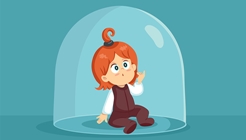 Is the decline in children's independent activity one cause of decline in their mental well-being?
Is the decline in children's independent activity one cause of decline in their mental well-being?
From an article in the Journal of Pediatrics
Peter Gray, Professor Dept. of Psychology and Neuroscience, Boston College and others have published a study regarding on increasing, all-time rates of anxiety and depression among school-aged children and teens in the US. The UK is also seeing increased mental health issues in children and teens, so these observations are also relevant to our context.
The American Academy of Pediatrics, American Academy of Child and Adolescent Psychiatry, and Children’s Hospital Association issued, in 2021, a joint statement that child and adolescent mental health be declared a “national emergency.”
Although most current discussions of the decline in youth mental health emphasize that which has occurred over the past 10-15 years, research indicates that the decline has been continuous over at least the last 5 or 6 decades.
Although a variety of causes of this decline have been proposed by researchers and practitioners, the focus of this study is on a possible cause that we believe has been insufficiently researched, discussed, and taken into account by health practitioners and policy makers.
Our thesis is that a primary cause of the rise in mental disorders is a decline over decades in opportunities for children and teens to play, roam, and engage in other activities independent of direct oversight and control by adults. Such independent activities may promote mental well-being through both immediate effects, as a direct source of satisfaction, and long-term effects, by building mental characteristics that provide a foundation for dealing effectively with the stresses of life.
We develop the thesis by summarizing evidence for:
-
a large decline over decades in children’s opportunities for independent activity;
-
a large decline over the same decades in young people’s mental health;
-
effects of independent activity on children’s immediate happiness; and
-
effects of independent activity in building long-term psychological resilience.
Those of us old enough to have been children in the 1970s or earlier know from experience that children then had far more freedom to roam, play, and engage in various activities independently of adults than do children today.
Research has confirmed that our memories are not distorted. For example, Markella Rutherford, Associate Professor of Sociology, Wellesley College, analysed hundreds of articles and advice columns about childrearing that appeared in popular magazines from the early 20th century onward. She found that earlier articles portrayed a world in which children spent much time with other children away from adults, walked or biked to school alone or with friends from as young as age 5 years, contributed meaningfully through chores to the household economy, and by age 11 or 12 years often had part-time jobs, such as babysitting and paper routes, performed without direct adult oversight.
Over time, however, beginning in the 1960s and accelerating in the 1980s, the implicit understanding shifted from that of children as competent, responsible, and resilient to the opposite, as advice focused increasingly on children’s needs for supervision and protection.
She noted, as have other reviewers, that in some respects - such as freedom to choose what they wear or eat - children have gained autonomy over the decades. What has declined specifically is children’s freedom to engage in activities that involve some degree of risk and personal responsibility away from adults.
Books on the history of childhood in America have likewise documented the decline of both free play and children’s independent, responsible contributions to family and community. These describe the first half of the 20th century as “the golden age of unstructured play” and shows how children’s free play, especially outdoors, declined from about 1960 on. Also “contemporary children are more regimented and constrained than ever before” and have “fewer socially valued ways to contribute to their family’s well-being or to participate in community life.”
In systematic surveys, parents have reported that their children play independently outdoors far less than they themselves did as children and that they limit their children’s freedom outdoors largely because of fears of crime and traffic.
Read the full study here.
Something to challenge cultural norms here?
Retweet about this article:
From an article in the Journal of Pediatrics, 10/01/2024